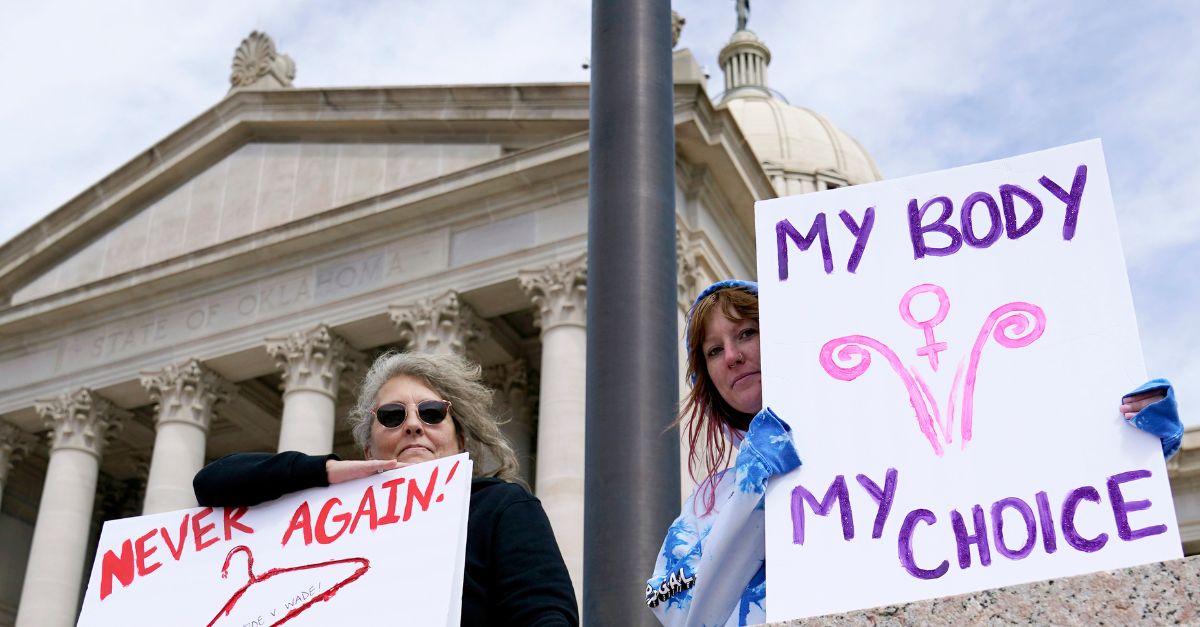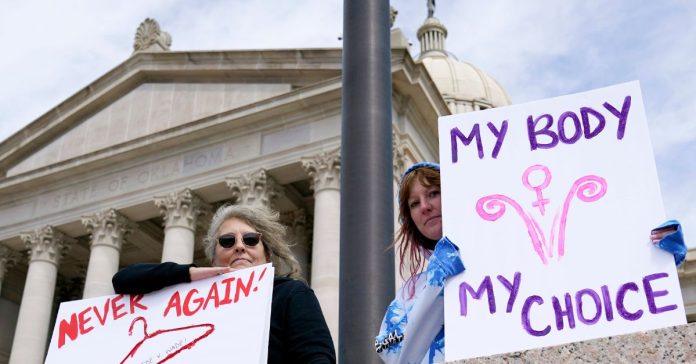
Dani Thayer, left, and Marina Lanae, right, both of Tulsa, Okla., hold pro-choice signs outside the state Capitol, Wednesday, April 13, 2022, in Oklahoma City. (AP Photo/Sue Ogrocki)
In Oklahoma, the only time abortion is legal is when the life of the mother is at risk in an emergency. There are no exceptions for rape or incest and what constitutes an emergency is still legally hazy.
But now, if a new law continues to hurdle through the state’s legislature, any time — and every time — someone has an abortion there, their name will be put into a unique database.
The bill hasn’t been made into law just yet, but it is getting close after vaulting out of a committee 5-1 in the state’s House on Feb. 15 and receiving necessary backing from a counterpart in the Oklahoma Senate, where Sen. Dave Bullard has signed on. The next stop is a hearing on the full floor of the statehouse and then a vote.
When that vote will be is uncertain, a spokesperson for the bill’s sponsor, Republican Rep. Kevin West, told Law&Crime by phone on Wednesday. The timing could move fast or slow, depending on how quickly the bill’s sponsors want to get it through.
The Oklahoma Right to Life Act does more than add names into a database. It tracks how many abortions that person has had and when they had one. It will catalog the “probable gestational age of the unborn human being” and what “method [was] used to calculate gestational age.”
It will also require all abortion recipients’ physicians to deliver a written statement declaring why the procedure was necessary to “preserve the life of the pregnant woman” and attest to it under oath.
All of this information is reported back to the Oklahoma State Department of Health and is meant to be confidential, according to a bill summary, but the full text of the bill points out the name could be unmasked with a court order.
As soon as the law is passed in Oklahoma, it would take effect within 30 days.
Notably, in Oklahoma, penalties for abortion providers are not just limited to the performing physician. The state uses a broader term of “health care provider,” meaning, according to the Oklahoma Human Right to Life Act, or HB 1326, “that would include physician assistants, nurses and nursing aides, medical assistants, hospital employees, medical facility employees or medical clinic employees.
In a report on the bill from the Daily Beast, local lawmakers like Oklahoma Minority Leader Cyndi Munson slammed the bill as a way to foment shame, fear and penalize people seeking abortions as well as those who provide them.
The bill’s sponsor, who did not immediately have a comment on the details of the law itself, reportedly argued in committee that the tracking system is much like the way state and federal offices would track births, or deaths.
When The Oklahoman covered debate on the bill after it got out of committee last week, it was noted that West came up with the legislation with the help of a Christian law firm with a long national reach: the Alliance Defending Freedom.
Another similar bill, HB 3013, is snaking its way to passage simultaneously. It is also co-sponsored by Bullard as well Oklahoma House Rep. Denise Crosswhite-Hader.
That bill criminalizes people who would deliver abortion-inducing drugs like mifepristone and would allow felony drug-trafficking charges to be brought with penalties, such as a fine of $100,000 or a sentence of up to 10 years in prison.
As Law&Crime previously reported, the Supreme Court will hear oral arguments on March 25 in FDA v. Alliance for Hippocratic Medicine to determine whether they can overturn a ruling that revoked approval for mifepristone last year.
Have a tip we should know? [email protected]

